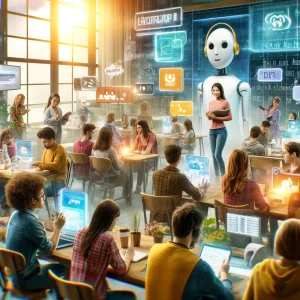In an era where artificial intelligence is rapidly advancing, the relationship between AI and human language skills presents a unique challenge. As AI becomes increasingly proficient in language-related tasks, such as translation and transcription, there is a debate about whether AI can surpass human language competencies. Questions arise about the necessity of learning foreign languages. AI technologies, especially in language translation and interpretation, have seen remarkable progress, but does this diminish the value of learning a language?
AI in language proficiency
AI technologies are making significant strides in areas like translation, transcription, and language learning. They offer remarkable efficiency and accessibility, providing instant translations and automated speech recognition. These advancements are particularly beneficial in scenarios where quick, basic understanding is required. However, AI’s capability in understanding and interpreting the deeper nuances of language – such as idiomatic expressions and emotional subtleties – is still limited.
The impact of AI on language barriers
AI has made significant strides in breaking down language barriers. Tools like real-time translation apps and AI-powered language learning platforms are changing the way we communicate across languages. However, these technologies are not perfect and often lack the nuance and cultural context that human language proficiency provides.
Breaking down walls, building bridges – the benefits of AI:
- Enhanced global communication: AI translation tools facilitate smoother communication across borders, enabling collaboration, information exchange, and cultural understanding on a global scale.
- Accessibility and convenience: real-time translation apps bridge the gap for travellers, tourists, and business professionals by offering on-the-go language assistance.
- Democratization of language learning: AI-powered platforms personalize the language learning process, making it more engaging and efficient for a wider range of learners.
A work in progress – the limitations of AI:
- Nuance and context: AI translation tools can struggle with the complexities of human language, including idioms, sarcasm, and cultural references.
- Accuracy and fluency: translations may not always be grammatically perfect or capture the full nuance of the original text.
- Evolving technology: AI translation is constantly evolving, but it still requires human oversight and editing for accuracy and natural-sounding translations.
The continuing importance of language learning
Despite AI advancements, learning foreign languages remains valuable. It fosters cultural understanding, enhances cognitive abilities, and provides a competitive edge in global business environments. Moreover, language learning is about more than just communication; it’s about understanding different perspectives and cultures. In the global job market, bilingualism or multilingualism remains a highly valued skill. Knowledge of foreign languages can open doors to international opportunities, cross-cultural collaborations, and a broader understanding of global issues.
The human advantage
The human mastery of language is deeply rooted in cultural, contextual, and emotional understandings that AI has yet to achieve. Despite AI advancements in language processing, human proficiency in languages holds unique value. Cultural nuances, idiomatic expressions, and emotional subtleties often get lost in AI translation. Human language skills enable deeper understanding and appreciation of different cultures, fostering better international relations and empathy. The subtleties of humour, irony, and empathy communicated through language are uniquely human traits. AI, in its current form, lacks the ability to fully grasp these aspects, which are critical for meaningful communication and connection.
AI as an aid, not a replacement
While AI can support and enhance certain language-related tasks, it is not a replacement for everything. AI can be a valuable tool for language learners, offering interactive and personalized learning experiences, as well as instant translations, and practice opportunities, but they cannot replicate the human ability to understand context and cultural layers in communication.
Learning alongside AI – the benefits of AI-powered language learning tools:
- Personalized learning: AI algorithms can personalize the learning experience based on individual strengths, weaknesses, and learning styles. This allows learners to focus on areas that need improvement and progress at their own pace.
- Interactive and engaging: AI-powered platforms can incorporate interactive exercises, games, and simulations to make language learning more engaging and enjoyable. This helps learners stay motivated and focused on their goals.
- Instant feedback and corrections: AI can provide instant feedback on pronunciation, grammar, and sentence structure, allowing learners to identify and correct mistakes as they go.
- 24/7 practice opportunities: AI language learning platforms offer constant access to practice exercises and conversation simulations. This allows learners to practice their skills at any time and place, regardless of a human partner’s availability.
Beyond the algorithm – where human expertise shines:
- Understanding context and cultural nuance: AI can struggle with the complexities of human language, including idioms, sarcasm, and cultural references. Human interaction allows learners to understand the context behind language and appreciate cultural subtleties that AI may miss.
- Developing communication skills: effective communication goes beyond translating words; it involves understanding body language, tone of voice, and nonverbal cues. AI cannot replicate the natural flow and social aspects of human conversation.
- Building confidence and fluency: regular conversation practice with native speakers is crucial for building confidence and developing fluency in a new language. AI can provide practice opportunities, but it cannot replace the value of interacting with real people.
As AI continues to evolve, its role in language-related tasks will undoubtedly expand. Future advancements may enable AI to better understand and replicate more complex aspects of human language. However, the deeply human elements of language, rooted in our emotions and social contexts, are likely to remain a uniquely human domain for the foreseeable future.
Foreign language knowledge continues to hold significant importance
The interplay between AI and human language skills is complex and evolving. While AI offers valuable tools for language tasks, it cannot replace the depth, emotional connection, and cultural understanding inherent in human language proficiency. The human aspect of language, with its richness and complexity, remains a unique and irreplaceable asset, underscoring the fact that in the realm of language, AI is an ally rather than a competitor.





